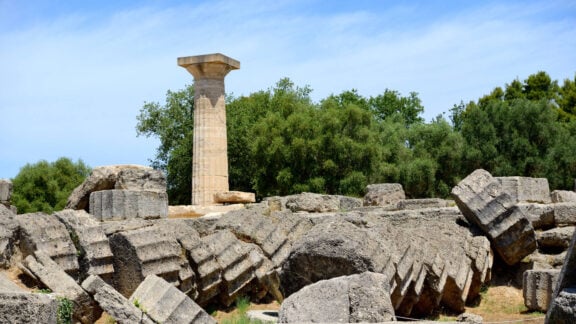The funeral for the former Greek Prime Minister Costas Simitis will be held on Thursday, 9 January, at 12pm at the Metropolitan Cathedral of Athens. The statesman, described even by opponents as a “great Greek,” passed away in the early hours of Sunday at the age of 88.
Simitis reportedly died at his holiday home in Agioi Theodoroi. He was rushed to the Corinth Hospital at 7.31am, unresponsive, and was pronounced dead at 7.50am after unsuccessful resuscitation efforts.
The Greek government has declared a four-day national mourning period, and Simitis’ funeral will be held with full state honours, equivalent to those accorded to a serving prime minister.
A life dedicated to Greece
Born in Piraeus on 23 June 1936, Costas Simitis studied law and economics in Germany and England, where he met his wife, Daphne Arkadiou Simitis. The couple had two daughters, Fiona and Marilena.
An active participant in the anti-junta movement (1967–1974), Simitis became a member of the Panhellenic Liberation Movement (PAK) in 1970 while in Germany. He was a founding member of PASOK in 1974, contributing significantly to the party’s “3rd of September Declaration”.
Simitis ascended to the role of prime minister on 18 January 1996, succeeding Andreas Papandreou after a PASOK parliamentary vote. He was later elected as PASOK leader, defeating Akis Tsochatzopoulos. During his tenure, Simitis won re-election as prime minister in April 2000, consolidating PASOK’s position in Greek politics.
He stepped down as party leader in January 2004, paving the way for a smooth political transition, while remaining prime minister until the national elections in March of that year.
Milestones and legacy
Simitis’ tenure was marked by significant achievements and controversy.
Key accomplishments include:
Greece’s Eurozone entry: Under his leadership, Greece joined the Economic and Monetary Union (EMU) in 2001, a milestone for the country’s financial stability.
Cyprus’ EU accession: Simitis orchestrated diplomatic efforts to secure Cyprus’ EU membership in 2004, despite the unresolved Cyprus issue.
Infrastructure modernisation: Projects like the Attiki Odos highway, the Athens Metro expansions, and Athens International Airport were completed during his administration.
2004 Olympic Games preparations: Infrastructure enhancements for the Athens Olympics took shape under his leadership.
Despite these successes, Simitis’ premiership faced challenges, including corruption allegations, controversies surrounding military procurement, and public backlash over financial policies.
Tributes from political figures
Greek President Katerina Sakellaropoulou described Simitis as “one of the most significant and multifaceted figures in modern Greek history.” She noted his emphasis on “methodology, rationality, and focus on goals,” which reshaped the political landscape during the post-junta era.
Prime Minister Kyriakos Mitsotakis expressed respect for Simitis as “a worthy and noble political opponent” who guided Greece through monumental national achievements, including Eurozone membership and Cyprus’ EU accession.
PASOK leader Nikos Androulakis praised Simitis for leaving a “great political legacy” and embodying the vision of a strong Greece within Europe.









